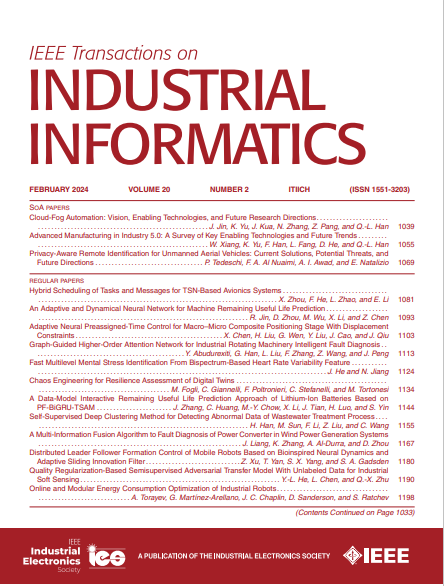EEG-based Emotion Recognition via Transformer Neural Architecture Search
IF 9.9
1区 计算机科学
Q1 AUTOMATION & CONTROL SYSTEMS
引用次数: 10
Abstract
Emotion recognition based on electroencephalogram (EEG) plays an increasingly important role in the field of brain–computer interfaces. Recently, deep learning has been widely applied to EEG decoding owning to its excellent capabilities in automatic feature extraction. Transformer holds great superiority in processing time-series signals due to its long-term dependencies extraction ability. However, most existing transformer architectures are designed manually by human experts, which is a time-consuming and resource-intensive process. In this article, we propose an automatic transformer neural architectures search (TNAS) framework based on multiobjective evolution algorithm (MOEA) for the EEG-based emotion recognition. The proposed TNAS conducts the MOEA strategy that considers both accuracy and model size to discover the optimal model from well-trained supernet for the emotion recognition. We conducted extensive experiments to evaluate the performance of the proposed TNAS on the DEAP and DREAMER datasets. The experimental results showed that the proposed TNAS outperforms the state-of-the-art methods.基于变压器神经结构搜索的脑电图情感识别
基于脑电图的情绪识别在脑机接口领域中发挥着越来越重要的作用。近年来,深度学习以其出色的自动特征提取能力被广泛应用于脑电解码。变压器具有提取长期依赖关系的能力,在处理时间序列信号方面具有很大的优势。然而,大多数现有的变压器架构都是由人类专家手动设计的,这是一个耗时且资源密集的过程。在本文中,我们提出了一种基于多目标进化算法(MOEA)的自动变压器神经结构搜索(TNAS)框架,用于基于脑电图的情感识别。提出的TNAS采用同时考虑准确率和模型大小的MOEA策略,从训练良好的超级网络中发现最优的情感识别模型。我们进行了大量的实验来评估所提出的TNAS在DEAP和dream数据集上的性能。实验结果表明,所提出的tas优于目前最先进的方法。
本文章由计算机程序翻译,如有差异,请以英文原文为准。
求助全文
约1分钟内获得全文
求助全文
来源期刊

IEEE Transactions on Industrial Informatics
工程技术-工程:工业
CiteScore
24.10
自引率
8.90%
发文量
1202
审稿时长
5.1 months
期刊介绍:
The IEEE Transactions on Industrial Informatics is a multidisciplinary journal dedicated to publishing technical papers that connect theory with practical applications of informatics in industrial settings. It focuses on the utilization of information in intelligent, distributed, and agile industrial automation and control systems. The scope includes topics such as knowledge-based and AI-enhanced automation, intelligent computer control systems, flexible and collaborative manufacturing, industrial informatics in software-defined vehicles and robotics, computer vision, industrial cyber-physical and industrial IoT systems, real-time and networked embedded systems, security in industrial processes, industrial communications, systems interoperability, and human-machine interaction.
 求助内容:
求助内容: 应助结果提醒方式:
应助结果提醒方式:


